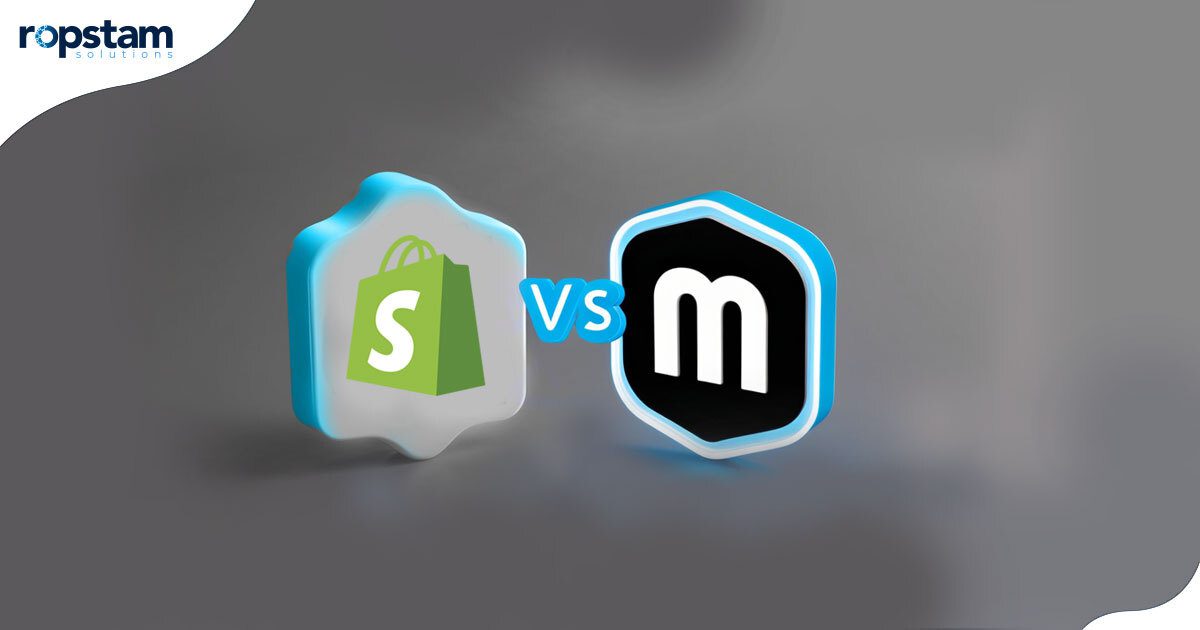As an online business owner, selecting the right ecommerce platform is a critical decision for you. Shopify and Magento are two of the most popular options on the market, each with its own strengths and weaknesses. Comprehending the roles of both platforms is necessary to make an informed decision and stay ahead of the curve in the evolving digital world.
Whether you’re a well-established online retailer or a beginner in this field, understanding the key differences between Shopify and Magento will enable you to build a successful online store. So, without further ado, let’s dig into the Shopify vs Magento debate.
What is Shopify?
Shopify is regarded as more than just an ecommerce platform; it’s a comprehensive solution designed to allow businesses of all sizes to thrive in the digital age. With millions of merchants already using Shopify, it’s clear that this platform has a proven track record of success.
It is pertinent to state here that Shopify is a user-friendly platform that simplifies the process of setting up and managing an online store. Whether you’re a seasoned entrepreneur or just starting out, Shopify’s user-friendly interface and extensive range of features make it easy to get up and running quickly.
Keep in mind that one of the standout features of Shopify is its omnichannel capabilities. This means you can sell your products not only on your online store but also through various other channels, such as social media, marketplaces, and even physical locations. This flexibility allows you to reach a wider audience and maximize your sales potential.
Popular websites built using Shopify
- www.allbirds.com
- www.elo.shopping
What is Magento?
Magento, an open-source ecommerce platform, has been powering some of the world’s leading brands since its inception in 2008. Originally developed by Varien, Magento has evolved into a flexible and versatile solution for businesses of all sizes.
One of Magento’s key strengths lies in its extensive range of features and capabilities. From its flexible shopping cart system to its support for multiple payment gateways, shipping methods, and languages, Magento provides merchants with the tools they need to create a seamless shopping experience.
Beyond its basic functionality, Magento also offers a wealth of marketing, SEO, and catalog management tools. These features allow business owners to drive traffic, improve search engine rankings, and effectively manage their product catalogs.
To summarize, Magento’s flexibility, wide range of features, and capabilities make it an ideal choice for you in order to establish a strong online presence.
Popular websites built using Magento
- www.coca-colastore.com
- www.barbour.com
Shopify vs Magento: Feature-wise Comparison
At Ropstam Solutions, we have a dedicated team of Ecommerce developers ready to take on your next project. Utilizing their expertise and prowess, here we have provided a comprehensive analysis of both Shopify and Magento, highlighting their pros and cons without any bias.
- Price
- Integrated Tools
- Themes
- Community Support
- Level of Customization
- No-code Development
- Ease of Use
- SEO Plugins
- Support for B2B Businesses
- Marketing Features
1. Price:
Shopify offers a range of pricing plans, from basic to enterprise-level. However, it also includes transaction fees for lower-tier plans. On the other hand, Magento is an open-source platform, meaning it’s free to download and use. However, you’ll need to invest in hosting, themes, and potentially developer resources. This means that in terms of cost-effectiveness, Magento is the clear winner.
Winner: Magento
2. Integrated Tools:
Shopify boasts a comprehensive suite of built-in tools, including payment gateways, shipping carriers, marketing features, and analytics. This makes it a convenient choice for businesses that prefer a more out-of-the-box solution. Magento, while providing a solid foundation, requires more customization and integration with third-party tools.
Winner: Shopify
3. Themes:
In short, both Shopify and Magento offer a variety of themes to customize your online store’s appearance. Shopify provides a vast library of professionally designed themes that can be easily installed and customized. Magento, meanwhile, also offers a degree of flexibility for creating custom themes, making it difficult to decide a winner in this context.
Winner: Draw
4. Community Support:
Both Shopify and Magento have large and active communities, providing valuable resources and support for users. Shopify’s community forum is well-organized and user-friendly, making it easy to find answers to your questions. Magento’s community is also equally active and extensive.
Winner: Draw
5. Level of Customization:
Magento offers unparalleled flexibility for businesses seeking complete control over their online store. It allows for extensive customization of every aspect of your website, from the layout and design to the functionality and features.
Shopify, while offering a high degree of customization, may not be as suitable for businesses with extremely complex requirements.
Winner: Magento
6. No-code Development:
Shopify is designed to be user-friendly, with minimal coding required for most tasks. This makes it an excellent choice for businesses that prioritize ease of use and want to avoid technical complexities. Magento, on the contrary, demands more technical expertise, especially for advanced customizations.
Winner: Shopify
7. Ease of Use:
Shopify’s intuitive interface and straightforward setup process make it a great option for businesses seeking a hassle-free platform. Meanwhile, Magento can be more complex to set up and manage, especially for those without technical experience. This makes Shopify an attractive option for non-technical users.
Winner: Shopify
8. SEO Plugins:
Recognizing its importance, both Shopify and Magento offer strong SEO capabilities. Shopify provides built-in SEO features and integrates well with popular SEO plugins. Similarly, Magento also offers a solid foundation for SEO optimization but may require more technical adjustments.
Winner: Draw
9. Support for B2B Businesses:
Shopify offers features like customer groups, quote requests, and wholesale pricing, making it suitable for B2B businesses. However, what makes Magento stand out in this regard is its extensive B2B functionalities, including advanced order management and account management, which are more appealing to businesses with complex B2B requirements.
Winner: Magento
10. Marketing Features:
From email marketing to social media integration and abandoned cart recovery, Shopify offers a suite of marketing tools. Similarly, Magento provides a solid foundation for marketing which may require more customization but is equally effective. To separate both platforms in terms of marketing tools is not feasible.
Winner: Draw
Collaborate with Ropstam Solutions For Your Next Shopify Project
In the ecommerce industry, Shopify and Magento are two of the most popular, in-demand, and powerful platforms. Both have their own strengths and weaknesses, and you must consider all the factors and parameters before choosing one for building your online store.
Rosptam Solutions boasts a decade of experience in the field of ecommerce and a team of dedicated Shopify developers. Partner with us for your next Shopify project and let us worry about all the technical details, so that you can focus primarily on your business. Give us a call or send us an email today for a free consultation session.














